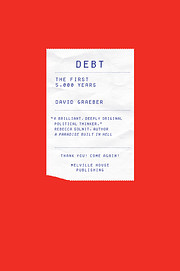

Pulse en una miniatura para ir a Google Books.
|
Cargando... Debt: The First 5,000 Years (2011 original; edición 2014)por David Graeber (Autor)
Información de la obraEn deuda : una historia alternativa de la economía por David Graeber (Author) (2011)

Top Five Books of 2014 (224) Rethinking Money (2) LT picks: Blue Books (82) » 7 más Actualmente no hay Conversaciones sobre este libro.   ) )La prima cosa da sapere su questo libro è che il suo autore, David Graeber, è un anarchico e che Debito è decisamente figlio di una visione anarchica del mondo e della storia. Quindi, se per voi le persone anarchiche sono quelle che spaccano le vetrine con un passamontagna in testa durante le manifestazioni, vi consiglio caldamente queste tre puntate (una, due e tre) del podcast di Riccardo Del Ferro dedicate appunto all’anarchia oggi. Quindi, Debito ci offre un punto di vista al quale non siamo abituatə (immagino che non moltə tra voi abbiano dimestichezza con l’anarchismo, vista la brutta fama che sembra avere) e che non ha come scopo quello di convincere chi legge della sua veridicità, ma solo di farci dire: «Sai che? Non l’avevo mai pensata in questo modo...». Questo è uno dei motivi per i quali ho amato questo libro: non so se sono d’accordo con Graeber, ma mi ha procurato un certo sommovimento neuronale e questo mi piace assai. Un altro motivo di apprezzamento per Debito è stata la sua ampia visione dei fenomeni umani: essendo Graeber un antropologo, il suo punto di vista è più globale che occidentale, un’altra cosa alla quale non siamo abituatə da queste parti. Non troverete l’idea che l’Occidente sia superiore ad altre parti del mondo (anzi… manco per niente). E ancora, Graeber non fa ruotare tutto intorno al maschio. Sembra una stranezza, ma a me non vengono in mente molti autori di saggi che abbiano citato il femminismo come un’autorevole corrente di pensiero che potrebbe portare ottime soluzioni ai problemi che affliggono il pianeta (oltre al fatto che è stato in grado di spiegare molti eventi storici). Infine, ho apprezzato il fatto che fosse un buon libro di divulgazione, molto scorrevole e niente affatto pesante, nonostante il tema non proprio alla mano: per il modo in cui affronta temi che pensiamo di conoscere bene o che diamo per scontato essere in una certa maniera finirete per divorarlo. I was reading it for a month. It went tought, but I persisted, unearthing every now an then a nugget or two of incomparable wisdom. I'm an athropologist, so I may be biased, but...if you're short of time, read first pages on refutation of the barter idyll, and then fast forward on to the last chapter, conclusion and the afterword. Your world will never be the same again. No kiddin'. An excellent, highly readable history of debt, our conceptions of it and how it has affected our entire political life. Has a LOT of stories and anecdotes and stuff from various times in history. Skimpy on some details but that's inevitable when you're doing such a wide ranging history and he always says enough to illustrate his point. I disagree with some of the stuff he says from a Marxist perspective but it's not totally shit - it's just I think he does the typical anarchist thing of ascribing changes to an amorphous "state." Ultimately though I thoroughly enjoyed it. A radical book that does a great job of challenging our preconceived notions of economics and what's "natural", pointing the way towards radical change and providing a fascinating historical primer along the way. The author, an anthropologist, teaches a very large amount about the origins of money and the history of debt. It is eye-opening, partly because he also teaches a lot of history of peoples from many other times. He is stunningly knowledgeable about many areas. I was absorbed by this book and will read others of his. sin reseñas | añadir una reseña
"Before there was money, there was debt. Every economics textbook says the same thing: Money was invented to replace onerous and complicated barter systems--to relieve ancient people from having to haul their goods to market. The problem with this version of history? There's not a shred of evidence to support it. Here anthropologist David Graeber presents a stunning reversal of conventional wisdom. He shows that for more than 5,000 years, since the beginnings of the first agrarian empires, humans have used elaborate credit systems to buy and sell goods - that is, long before the invention of coins or cash. It is in this era, Graeber argues, that we also first encounter a society divided into debtors and creditors. Graeber shows that arguments about debt and debt forgiveness have been at the center of political debates from Italy to China, as well as sparking innumerable insurrections. He also brilliantly demonstrates that the language of the ancient works of law and religion (words like guilt, sin, and redemption) derive in large part from ancient debates about debt, and shape even our most basic ideas of right and wrong. We are still fighting these battles today without knowing it"--Publisher's description. No se han encontrado descripciones de biblioteca. |
Debates activosNingunoCubiertas populares
 Google Books — Cargando... Google Books — Cargando...GénerosSistema Decimal Melvil (DDC)332Social sciences Economics FinanceClasificación de la Biblioteca del CongresoValoraciónPromedio: (4.18) (4.18)
¿Eres tú?Conviértete en un Autor de LibraryThing. |
||||||||||||||||||||||||||||||||||||||||||||||||||||||||||||||||||||||||||||||||||||||||||||||||||||||||||||||||||||||||||||||||||||||